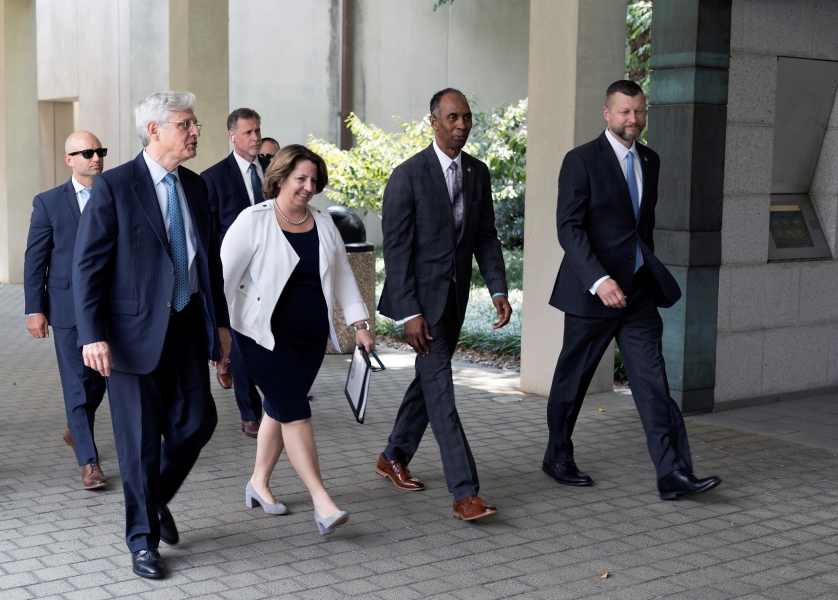Domestic Violence, Dating Violence, Sexual Assault and Stalking: Deputy Attorney General Lisa O. Monaco Testifies on Reauthorizing the Violence Against Women Act
Attorney General Garland and Deputy General Lisa Monaco arrive at ATF Headquarters to launch five cross-jurisdictional strike forces to help reduce gun violence by disrupting illegal firearms trafficking in key regions across the country
Thank you very much, Mr. Chairman, Ranking Member Grassley, and members of the Committee. I appreciate very much the opportunity to speak to you today. The Violence Against Women Act has had an enormous impact in combatting domestic violence, dating violence, sexual assault and stalking, and I am here to urge Congress to reauthorize and to strengthen it.
Before we get started though, Mr. Chairman with your indulgence, I would like to recognize several tragedies that the Department of Justice has suffered in recent days. Yesterday in Tucson, Arizona, a DEA agent was shot and killed, and a second DEA agent and a task force officer were shot and wounded. Separately, last Friday, a Deputy U.S. Marshal succumbed to injuries from a vehicle accident that occurred while he was assisting with a law enforcement operation. These sacrifices remind all of us of the risks law enforcement take every day to protect the communities that they serve. My thoughts and prayers are with their families, and the men and women of the DEA and the U.S. Marshals Service.
Now Mr. Chairman and Ranking Member Grassley, the original passage of the Violence Against Women Act (VAWA) in 1994, as you have noted Mr. Chairman, had a major impact on my own life. At the time I was a young staff member on this Committee, working for then-Chairman Biden, and one of my responsibilities included responding to letters from people who wrote to the Committee. Time and again, I read firsthand accounts not only about the violence that too many people — mostly women — suffered at the hands of their intimate partners, but also about the lack of accountability for these crimes.
Statistics the Committee reported during that period painted a very grim picture: 98% of rape victims never saw their attacker caught, tried and imprisoned — meaning almost all perpetrators of rape walked free. Fewer than half of people arrested for rape were convicted, and almost half of convicted rapists could expect to serve a year or less in jail.
My conversations with individual survivors, rape crisis centers, domestic violence shelters, emergency rooms and police stations put a tragic human face on those statistics. This experience led me to want to go to law school and it led me into public service; it drew me to a career in law enforcement and criminal justice. With the passage of VAWA, I saw how a law could make a real difference in people’s lives and I saw what Congress could accomplish through thoughtful policy, driven by courageous voices, experts and bipartisan leadership.
Congress reauthorized VAWA in 2000, 2005, and 2013 — each time with bipartisan support. Over the years, we have made substantial progress, but the need for VAWA’s programs and protections is as critical as ever. I would like to highlight just a few of the items the department sees as priorities for a reauthorization bill:
First, reauthorizing VAWA’s vitally important grant programs at the $1 billion funding levels included in the President’s FY 2022 request, this will ensure communities can provide critical services to survivors, as well as the right tools and training to make sure that responses to these crimes are survivor-centered and trauma-informed. I am pleased to announce today that the Office of Violence Against Women has issued this year more than $476 million in grants to help state, local and tribal organizations support survivors as they heal, promote victim access to justice and train professionals to respond to domestic violence, dating violence, sexual assault and stalking.
Second, we need to find new ways to reach and improve services for underserved populations, including culturally specific communities.
Third, expanding the ability of tribes to protect their communities from domestic and sexual violence through expanded jurisdiction.
And fourth, reducing homicides through federal firearms laws, including by closing the so-called “boyfriend loophole” that leaves countless victims at risk.
Pages: 1 · 2
More Articles
- Attorney General Merrick B. Garland Delivers Remarks at the U.S. Attorney’s Office for the Southern District of New York
- “Few rights are more central to individual freedom than the right to control one’s own body. The Justice Department will use every tool at our disposal to protect reproductive freedom."
- Attorney General Merrick B. Garland Statement on Supreme Court Ruling in Dobbs v. Jackson Women’s Health Organization
- Attorney General Barr Testifies on Justice Department Mission and Programs: Watch From the Beginning
- Special Counsel Robert S. Mueller III Makes Statement on Investigation into Russian Interference in the 2016 Presidential Election
- If You're Looking For A Link To the Mueller Report, Look No Further
- Cities, States Resist — and Assist — Senate Hearing on Immigration Crackdown in New Ways and Reunification of Migrant Families
- Download the Indictment: Grand Jury Indicts Thirteen Russian Individuals and Three Russian Companies for Scheme to Interfere in the United States Political System
- Sally Yates, a "Truly Noble, Heroic Figure", a Woman of the Year
- Dianne Feinstein's Statement on Recent Statements by President Donald J. Trump







